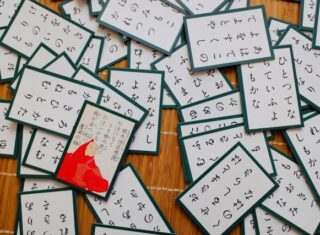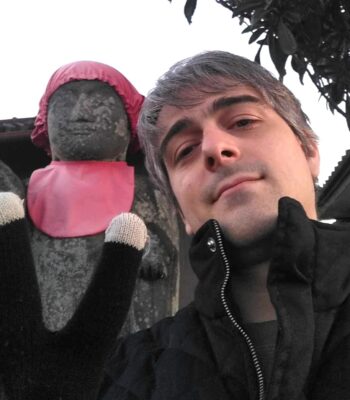- Learning Japanese
19 Useful Japanese Phrases for Travel: Try Using Them in Different Situations!
2024.12.16
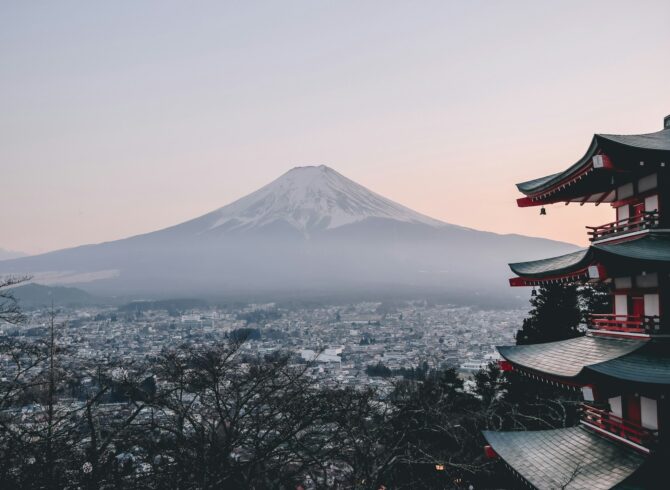
If you’re about to go on your long awaited trip to Japan, I’m sure you’re thinking "Before I go, I’d really like learn some useful Japanese phrases…"
Of course you do! Since it’s your special trip to Japan, you probably want to communicate with locals in Japanese, right?
That’s why, in this article, we’ll explain travel-friendly Japanese phrases categorized by scenarios such as "Greetings and Common Phrases," "Asking for Directions," "Conversations at Train Stations," and "Conversations at Restaurants."
We’ll also cover Japanese phrases to use in emergencies when you need help, so be sure to use this as a reference during your trip.
Useful Japanese Phrases for Travel: Greetings and Common Phrases
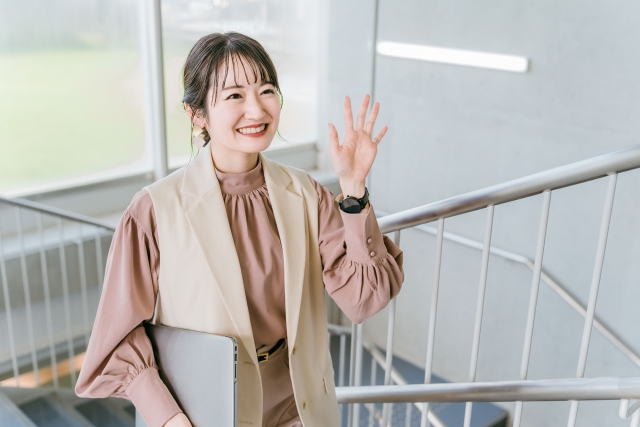
Here are four essential Japanese greetings and common phrases for travel:
- おはようございます (Ohayou gozaimasu) - Good morning
- こんにちは (Konnichiwa) - Hello
- こんばんは (Konbanwa) - Good evening
- よろしくお願いします (Yoroshiku onegaishimasu) - Please take care of me / Nice to meet you
- ありがとうございます (Arigatou gozaimasu) - Thank you
- もう一度よろしいですか? (Mou ichido yoroshii desu ka?) - Could you repeat that, please?
In this section, we’ll explain these greetings and commonly used phrases in detail.
おはようございます (Ohayou gozaimasu), こんにちは (Konnichiwa), こんばんは (Konbanwa)
The phrases おはようございます (Ohayou gozaimasu), こんにちは (Konnichiwa), and こんばんは (Konbanwa) are commonly used Japanese greetings.
- おはようございます (Ohayou gozaimasu)
This is a morning greeting used from sunrise until around 10 a.m. - こんにちは (Konnichiwa)
This is a daytime greeting typically used from around 10 a.m. to 5 p.m. - こんばんは (Konbanwa)
After 5 p.m. in the evening, this phrase is the natural choice for greetings.
よろしくお願いします (Yoroshiku onegaishimasu)
“Yoroshiku onegaishimasu” is one of the most frequently used phrases in Japanese communication.
It’s a versatile phrase that can be used in various situations, but during travel, it is mainly used when you want to politely accept or request something that has been suggested.
While saying "はい" (hai) to affirm a question is common, it can sometimes come across as cold depending on the context. Using "よろしくお願いします" (yoroshiku onegaishimasu) instead makes your response sound more polite and warm.
For example, if a café staff member asks, "飲み物をお付けしますか?" (nomimono o otsuke shimasu ka?) — "Would you like a drink with that?" — responding with "よろしくお願いします" (yoroshiku onegaishimasu) communicates polite affirmation, and the staff will gladly provide your drink.
ありがとうございます (Arigatou gozaimasu)
"ありがとうございます" (arigatou gozaimasu) is the phrase used to express gratitude in Japanese.
When someone does something for you, saying "ありがとうございます" (arigatou gozaimasu) conveys your thanks. Often, the other person will respond with a smile and say, "いいえいいえ" (iie iie) — "No, no, it’s nothing" — making for a pleasant interaction.
もう一度よろしいですか? (Mou ichido yoroshii desu ka?)
"もう一度よろしいですか?" (mou ichido yoroshii desu ka?) is a useful phrase when you need someone to repeat themselves because their speech was too fast or too complex to understand.
By saying "もう一度よろしいですか?" (mou ichido yoroshii desu ka?), the other person will likely slow down and use clearer, more polite language when repeating what they said.
Useful Japanese Phrases for Travel: Asking for Directions
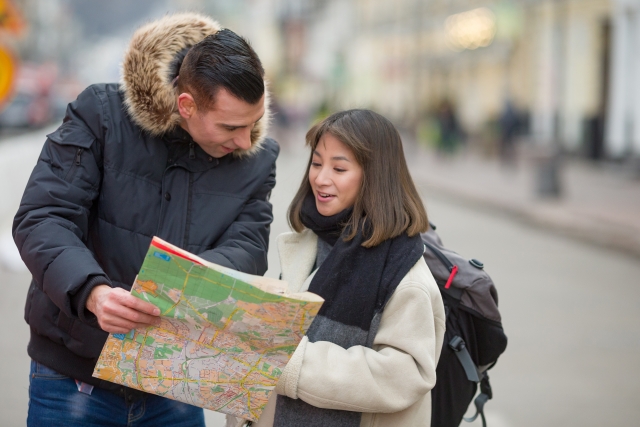
Here are two key phrases for asking for directions while traveling in Japan:
- "すみません" (sumimasen)
- "〇〇はどこですか?" (〇〇 wa doko desu ka?)
(For intermediate learners: "〇〇はどちらですか?" (〇〇 wa dochira desu ka?))
Let’s break these phrases down.
すみません (Sumimasen)
"すみません" (sumimasen) is a phrase used to politely get someone’s attention when you want to ask a question or seek approval.
When asking for directions, suddenly asking a question without an introduction can be seen as rude. It’s always good to start with "すみません" (sumimasen) before proceeding to your question.
〇〇はどこですか?(〇〇 wa doko desu ka?)
"〇〇はどこですか?" (〇〇 wa doko desu ka?) is one of the most convenient phrases for asking for directions.
Replace "〇〇" with the name of your desired location, and people will typically help you by pointing you in the right direction or explaining how to get there.
For those more familiar with Japanese, using the phrase "〇〇はどちらですか?" (〇〇 wa dochira desu ka?) instead makes your question more polite and leaves a good impression.
Recommended Reading:
Oku Sensei’s Japanese Customer Testimonials
Useful Japanese Phrases for Travel: Conversations at the Train Station
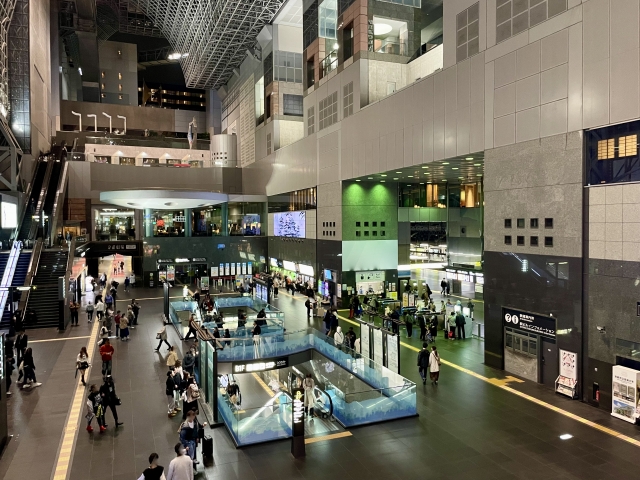
When traveling by train in Japan, here are two useful Japanese phrases:
- "〇〇までの切符をください" (〇〇 made no kippu o kudasai) – A ticket to 〇〇, please
- "〇〇に行きたいです。どうやって行きますか?" (〇〇 ni ikitai desu. Dou yatte ikimasu ka?)
(For intermediate learners: "〇〇まではどのように行けばいいですか?" (〇〇 made wa dono you ni ikeba ii desu ka?) – How can I get to 〇〇?)
Let’s explore these phrases in more detail.
〇〇までの切符をください (A ticket to 〇〇, please)
"〇〇までの切符をください" (〇〇 made no kippu o kudasai) is a phrase used when purchasing a train ticket.
By replacing "〇〇" with the name of your destination station and saying it to the station staff, they will let you know the fare to that station and assist you in purchasing your ticket.
〇〇に行きたいです。どうやって行きますか? (I want to go to 〇〇. How do I get there?)
"〇〇に行きたいです。どうやって行きますか?" (〇〇 ni ikitai desu. Dou yatte ikimasu ka?) is a helpful phrase to use when you don’t know the train platform, transfer route, or which station to get off at.
By replacing "〇〇" with the name of your destination station and asking the station staff or other passengers, they will kindly explain how to reach your destination.
For a more polished way to ask, try using the intermediate-level phrase:
"〇〇まではどのように行けばいいですか?" (〇〇 made wa dono you ni ikeba ii desu ka?) – How can I get to 〇〇?
Useful Japanese Phrases for Travel: Conversations at Restaurants

When dining out in Japan, here are five useful Japanese phrases:
- "メニューをいただけますか?" (Menyuu o itadakemasu ka?) – Can I have a menu?
- "注文をお願いします" (Chuumon o onegaishimasu) – I’d like to order, please.
- "これを1つください" (Kore o hitotsu kudasai) – I’ll have one of these, please.
- "いただきます" (Itadakimasu) – Let’s eat (expression of gratitude).
- "お会計をお願いします" (Okaikei o onegaishimasu) – The bill, please.
Let’s break these down further:
メニューをいただけますか? (Can I have a menu?)
"メニューをいただけますか?" (Menyuu o itadakemasu ka?) is used when you’d like to see a menu at a restaurant.
After being seated, if there’s no menu on the table, you can politely ask the staff by saying, "メニューをいただけますか?" (Menyuu o itadakemasu ka?).
注文をお願いします (I’d like to order, please)
"注文をお願いします" (Chuumon o onegaishimasu) is a phrase used when you’ve decided what to order and want to call the staff.
At places where orders are taken at the table, you can say this phrase from your seat. In restaurants where you order at the counter, use it when you approach and don’t see staff immediately.
これを1つください (I’ll have one of these, please)
"これを1つください" (Kore o hitotsu kudasai) is a convenient phrase for ordering while looking at the menu.
Point to the dish you want on the menu and say, "これを1つください" (Kore o hitotsu kudasai), to order a single serving of that item.
いただきます (Let’s eat)
"いただきます" (Itadakimasu) is a phrase used before starting a meal to express gratitude.
It reflects appreciation for the people who prepared the food and the ingredients themselves. In Japan, it’s customary to say "いただきます" (Itadakimasu) before every meal.
By the way, after finishing your meal, it’s customary to say, "ごちそうさまでした" (Gochisousama deshita) – Thank you for the meal.
お会計をお願いします (The bill, please)
"お会計をお願いします" (Okaikei o onegaishimasu) is a phrase used when asking for the bill at the end of your meal.
Some restaurants require you to bring the table’s receipt to the cash register. In that case, when you reach the register, simply say, "お会計をお願いします" (Okaikei o onegaishimasu).
Useful Japanese Phrases for Travel: Conversations While Shopping

When shopping in Japan, here are two useful Japanese phrases:
- "試着してもいいですか?" (Shichaku shite mo ii desu ka?) – Can I try this on?
- "これはいくらですか?" (Kore wa ikura desu ka?) – How much is this?
Let’s look at these phrases in detail:
試着してもいいですか? (Can I try this on?)
"試着してもいいですか?" (Shichaku shite mo ii desu ka?) is a phrase used when you’d like to try on clothes at an apparel shop.
Bring the clothing item to the staff and politely ask, "試着してもいいですか?" (Shichaku shite mo ii desu ka?).
これはいくらですか? (How much is this?)
"これはいくらですか?" (Kore wa ikura desu ka?) is used to ask about the price of an item.
Sometimes, the price tag isn’t visible on the item. In such cases, point to the item and ask, "これはいくらですか?" (Kore wa ikura desu ka?).
Useful Japanese Phrases for Travel: Conversations at the Hotel
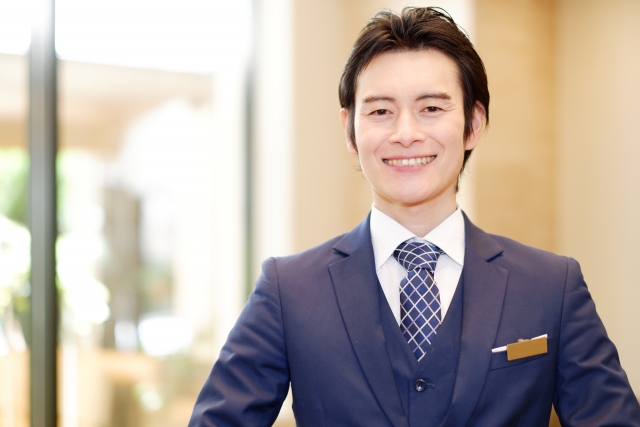
When staying at a hotel in Japan, here are two useful Japanese phrases:
- "チェックインをお願いします" (Chekkuin o onegaishimasu) – I’d like to check in, please.
- "部屋を変えていただけますか?" (Heya o kaete itadakemasu ka?) – Could I change rooms, please?
Let’s break these phrases down further:
チェックインをお願いします (I’d like to check in, please)
"チェックインをお願いします" (Chekkuin o onegaishimasu) is the phrase used when checking into a hotel at the reception desk.
When checking in, it’s a good idea to also provide the name under which the reservation was made.
部屋を変えていただけますか? (Could I change rooms, please?)
"部屋を変えていただけますか?" (Heya o kaete itadakemasu ka?) is used to politely request a different room if there’s a problem with your current one.
If you express your concern clearly, hotel staff will assist you in resolving the issue.
Recommended Reading:
How Long Does It Take to Learn Japanese? Tips for Faster Mastery
Useful Japanese Phrases for Travel: Asking for Help
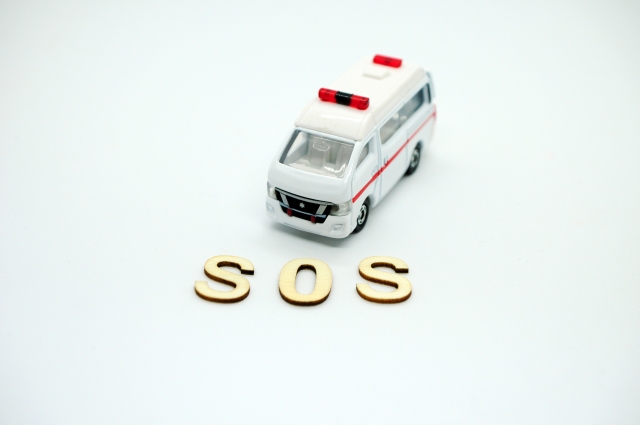
When you need help during your trip, here are two essential Japanese phrases:
- "助けて!" (Tasukete!) – Help!
- "痛い!" (Itai!) – It hurts!
Here’s how these phrases can be used:
助けて! (Help!)
"助けて!" (Tasukete!) is the phrase used to call for help in emergencies.
If you or a friend experience an accident and don’t know what to do, saying "助けて!" (Tasukete!) will alert people around you to assist.
痛い! (It hurts!)
"痛い!" (Itai!) is used to express pain, such as when you’re injured or experiencing severe discomfort.
If you feel significant pain, don’t hesitate to say "痛い!" (Itai!)—it can prompt those around you to call an ambulance or direct you to the nearest hospital.
Summary: 19 Useful Japanese Phrases for Travel
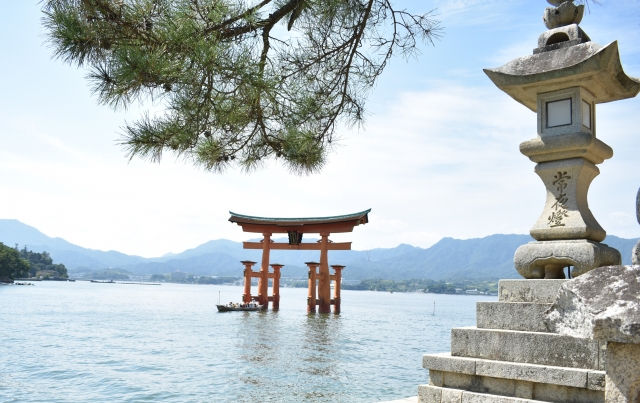
If you’re planning a trip to Japan, be sure to use the 19 phrases introduced in this guide!
If your trip inspires you to learn more about Japan and its language, try exploring Oku Sensei's Japanese online lessons.
With Oku Sensei's Japanese, you can improve your Japanese reading, writing, listening, and speaking skills while also learning about Japanese culture, traditions, society, and history.
You’ll acquire practical Japanese skills, such as writing emails or academic papers in Japanese, and conversational skills that even impress native speakers.
Special Offer: Right now, Oku Sensei's Japanese is offering a 30-minute free consultation, so be sure to check it out!




